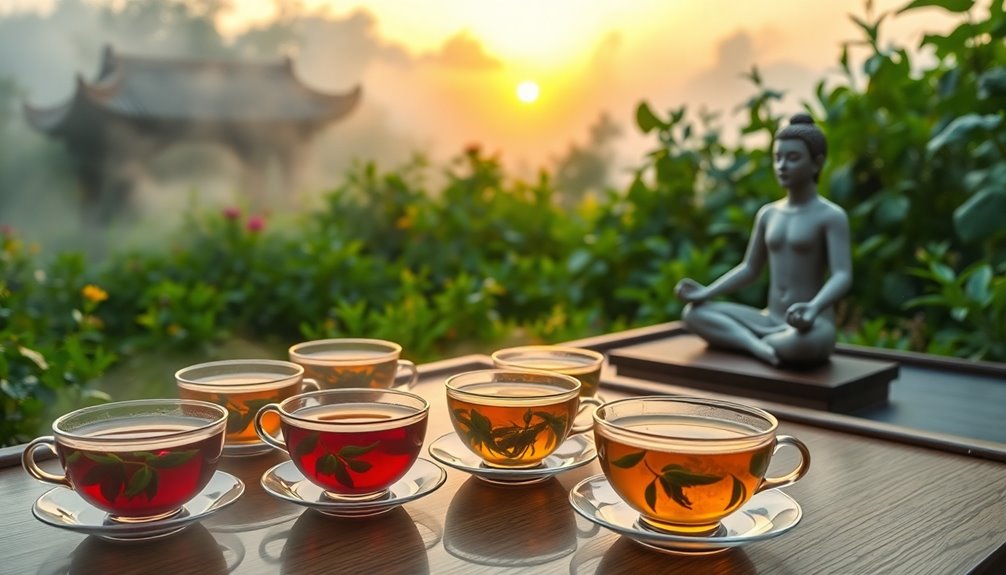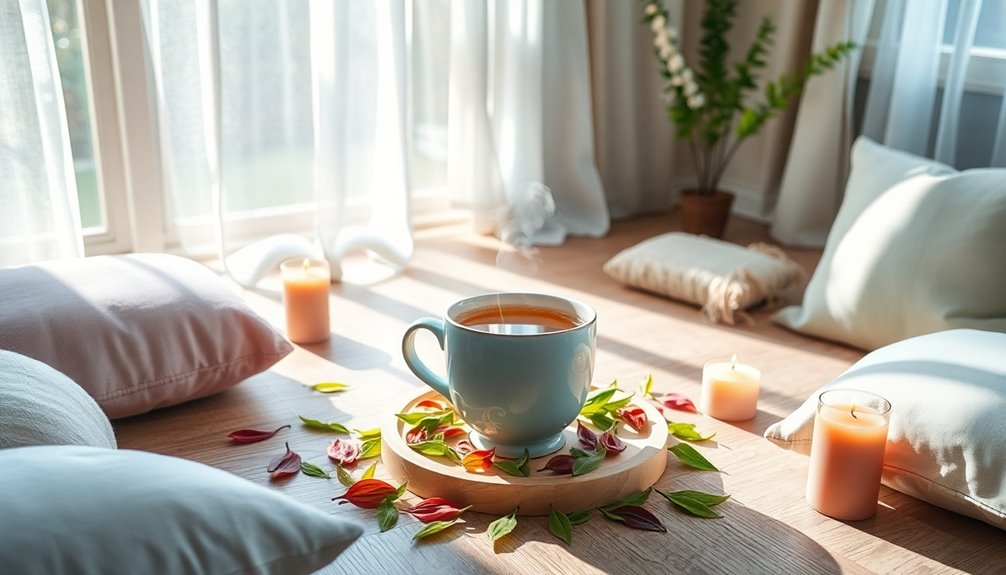Tea flavors can significantly boost your meditation success by creating a calming atmosphere and enhancing focus. Soothing options like chamomile help you relax, while fragrant floral teas, such as jasmine, can uplift your mood. Rich green teas increase alertness, making them perfect for morning sessions. The unique taste and scent of each tea engage your senses, anchoring you in the moment and improving awareness. Personal preferences also matter—choose light teas for hot days and hearty ones when it's cold. By exploring these flavorful options, you can deepen your meditation practice and enjoy the experience even more. Excited to learn how?
Key Takeaways
- Specific tea flavors, like chamomile and jasmine, enhance relaxation and focus, supporting deeper meditation experiences.
- The aroma and taste of tea can evoke positive emotions, aiding concentration during meditation.
- Unique tea profiles, such as earthy pu-erh, help ground practitioners in the present moment.
- Engaging the senses through tea can heighten awareness, making meditation more effective.
- Personal preferences for tea flavors influence emotional responses, shaping overall meditation success.
Introduction
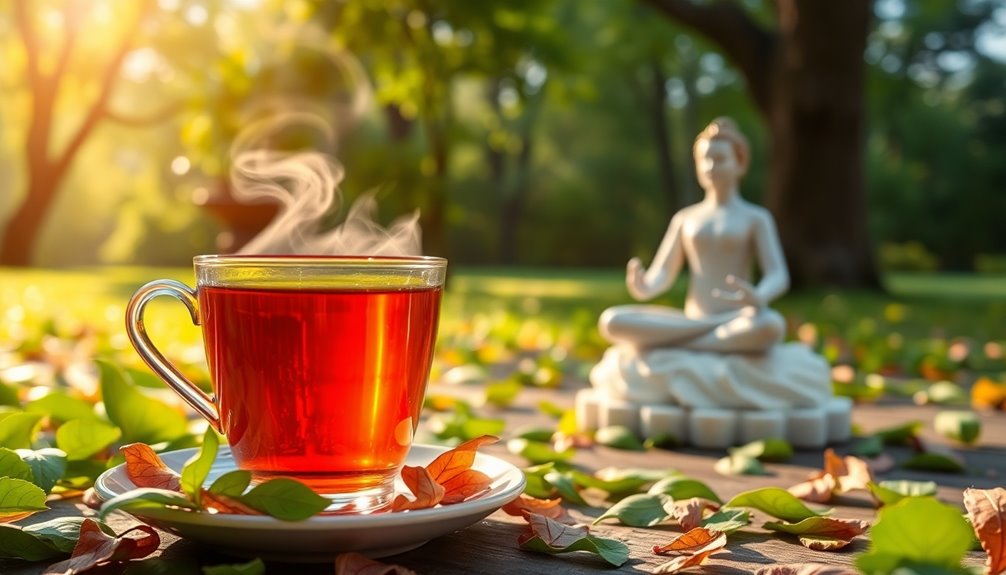
Exploring the connection between tea flavors and meditation can enhance your mindfulness journey. When you sip on tea during meditation, the flavor profile plays a big part in your experience.
Green tea, with its fresh and grassy notes, is great for helping you feel calm and focused. It's packed with L-theanine, which works wonders for mental clarity. On the other hand, herbal teas like chamomile, known for their floral sweetness, are perfect for evening meditation. They promote tranquility and help reduce anxiety.
The aromatic properties of different teas can also boost your meditation practice. Imagine the calming scent of mint or the earthy tones of pu-erh tea—they can evoke feelings that deepen your meditative state.
Plus, your personal preferences in tea flavors can make your meditation more enjoyable. By choosing a tea you love, you're likely to feel more connected to your practice.
Tea's Role in Calming Focus
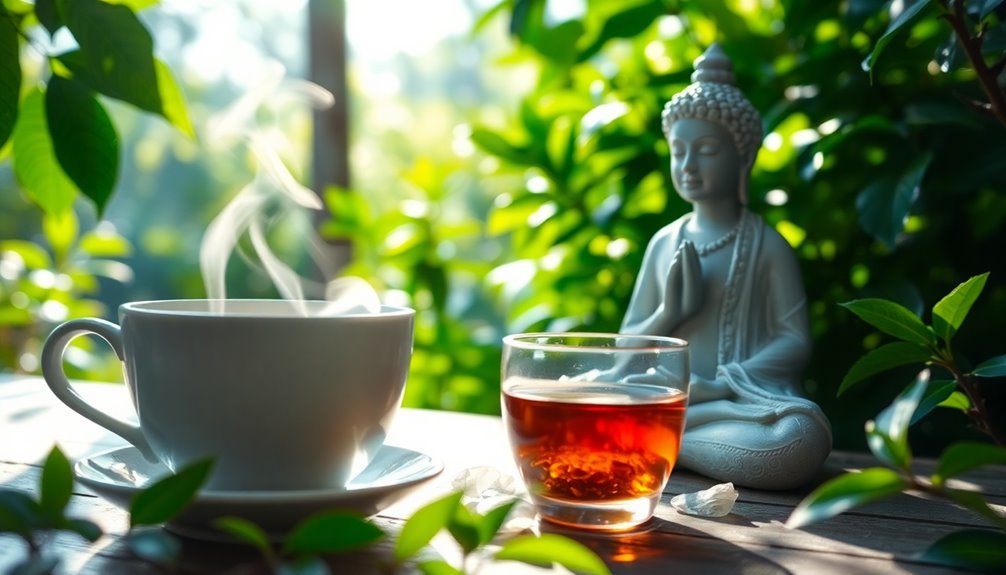
Tea plays a significant role in calming your focus during meditation. When you choose tea for meditation, like green or white tea, you benefit from the special combination of L-theanine and caffeine. This mix creates what's known as "calm energy," helping you feel alert yet relaxed, without any jitteriness. Additionally, the caffeine content in green tea typically ranges from 20-45 mg per 8 oz, providing just the right amount of stimulation. Drinking tea infused with essential oils can further enhance relaxation.
The aromatic properties of tea can also enhance your experience. As you sip, the delightful scents help promote relaxation and mental clarity. If you're looking for a caffeine-free option, consider chamomile or rooibos for your evening meditation sessions; they can be perfect for soothing your mind. Rooibos is known for its antioxidant properties, making it a beneficial choice for your health.
Engaging in mindful tea preparation is another great way to enhance your meditation practice. Take your time to brew your tea, focusing on each step. This ritual helps you set a calming tone, making it easier to enter a meditative state. The proper brewing techniques can further elevate your tea experience, ensuring optimal flavor and benefits.
Studies show that L-theanine increases alpha brainwave activity, which can improve your mood and reduce anxiety. Combining these elements creates an atmosphere that supports deeper meditation outcomes.
Flavor Influences Meditation Depth
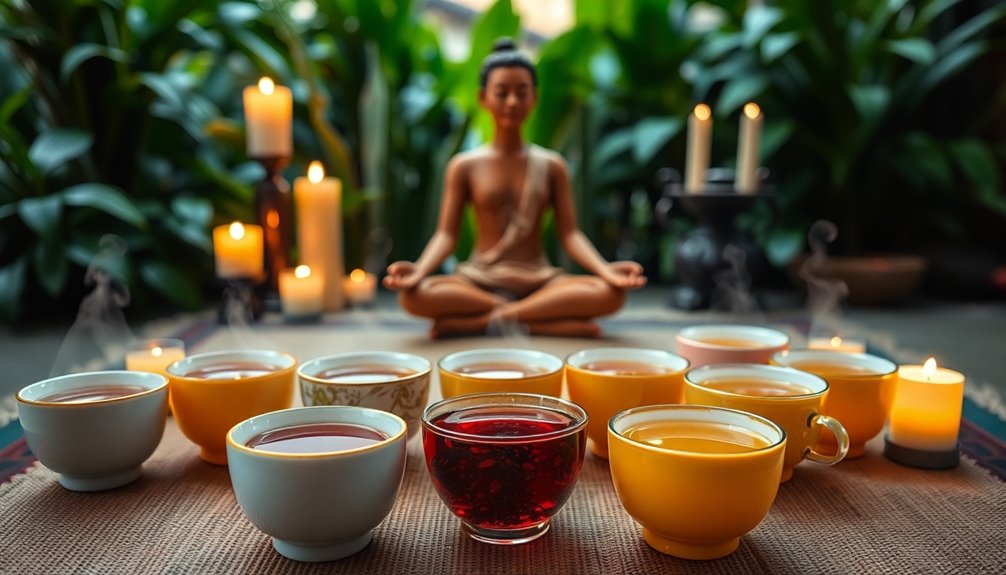
Your choice of tea flavor can significantly influence the depth of your meditation. When you select a soothing tea, like chamomile, you may find yourself relaxing more easily, which can lead to deeper meditation experiences. These calming flavors help quiet your mind, allowing you to connect with your emotions and enhance your overall experience.
Herbal teas with floral or fruity notes often evoke positive emotions. As you sip these delightful flavors, you might feel uplifted, making it easier to focus during your meditation sessions.
On the other hand, certain green teas have a bitter taste that can sharpen your alertness, helping you maintain concentration for longer periods.
The aroma of different teas plays a vital role too. It can bring back memories or feelings that deepen your connection to mindfulness. Engaging with the taste and aroma during meditation not only boosts your presence but also improves your overall meditation outcomes.
Flavor Profiles Enhance Mindfulness
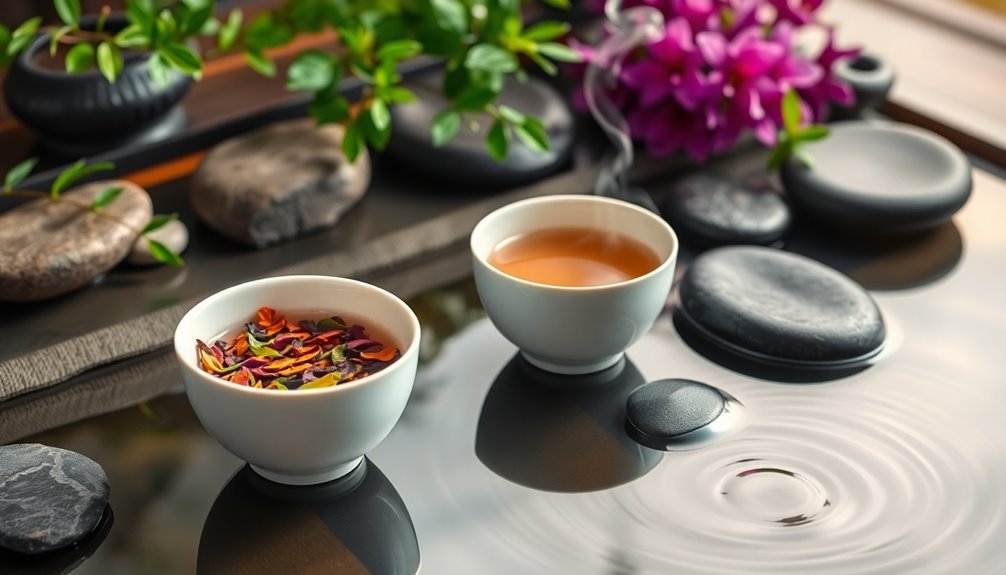
Often, the unique flavor profiles of various teas can enhance your mindfulness during meditation. When you choose a tea with distinct flavors, like the earthy notes of pu-erh or the sweet hints of chamomile, you can create a richer experience for your practice. Each aromatic sip encourages you to focus on the present moment, allowing you to savor the intricate tastes and smells. Research shows that pleasant scents can trigger the release of neurotransmitters like serotonin and dopamine, which also contribute to relaxation. Additionally, enjoying teas rich in antioxidants may further support your overall health and well-being.
Savoring these flavors acts as a meditative anchor, reducing distractions and helping your thoughts settle. Research shows that engaging your senses plays a crucial role in grounding you during meditation. By concentrating on tea's diverse flavor profiles, you can heighten your awareness and deepen your connection to the practice. Additionally, flower teas like lavender are known for calming effects, making them an excellent choice for enhancing relaxation during meditation.
As you explore different teas, pay attention to how their flavors resonate with you. Selecting teas that you genuinely enjoy makes each meditation session more pleasurable and encourages you to return. This connection between flavor and mindfulness not only enhances your experience but also increases your motivation to practice regularly. So, the next time you meditate, prepare a cup of your favorite tea and let its unique flavors guide you into a more mindful state.
Flavor Preferences and Meditation
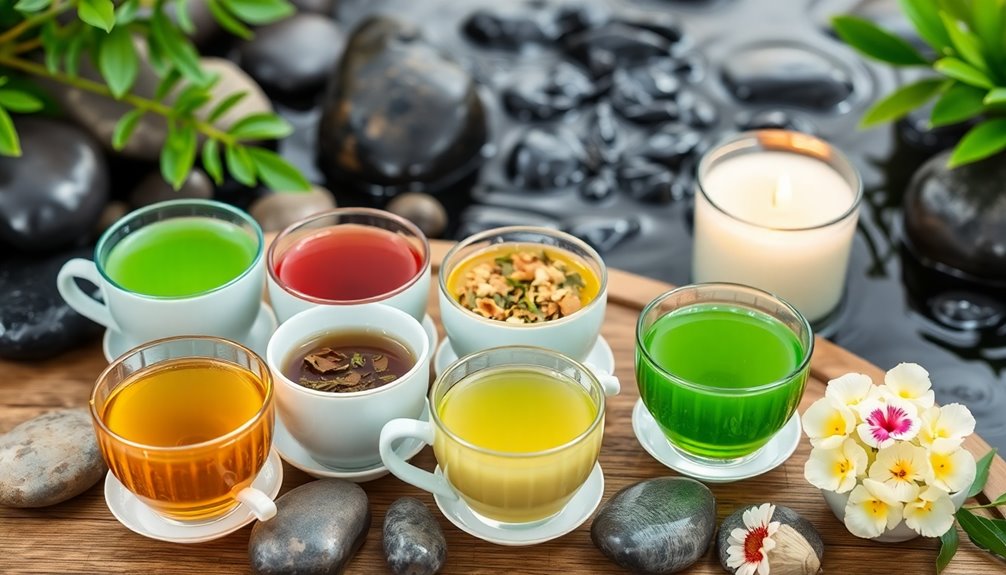
Flavor preferences can play a crucial role in shaping your meditation experience, as different teas evoke various emotional responses. When you choose a tea for your tea meditation, think about how its flavor can enhance your mindfulness.
For instance, floral teas like jasmine or chamomile are known for their calming effects. These flavors can help you relax and achieve a peaceful state of mind, making it easier to focus during meditation.
On the other hand, earthy flavors found in pu-er tea can ground you. This connection to the present moment can deepen your focus and make your practice even more effective.
Don't forget that personal taste also matters! If you enjoy lighter, refreshing teas like green tea during warmer months, or richer, warmer flavors like rooibos in colder seasons, you'll likely find your meditation more engaging. Additionally, incorporating herbal teas like chamomile tea can further enhance your relaxation during meditation, allowing for a deeper connection to your practice.
Practical Applications
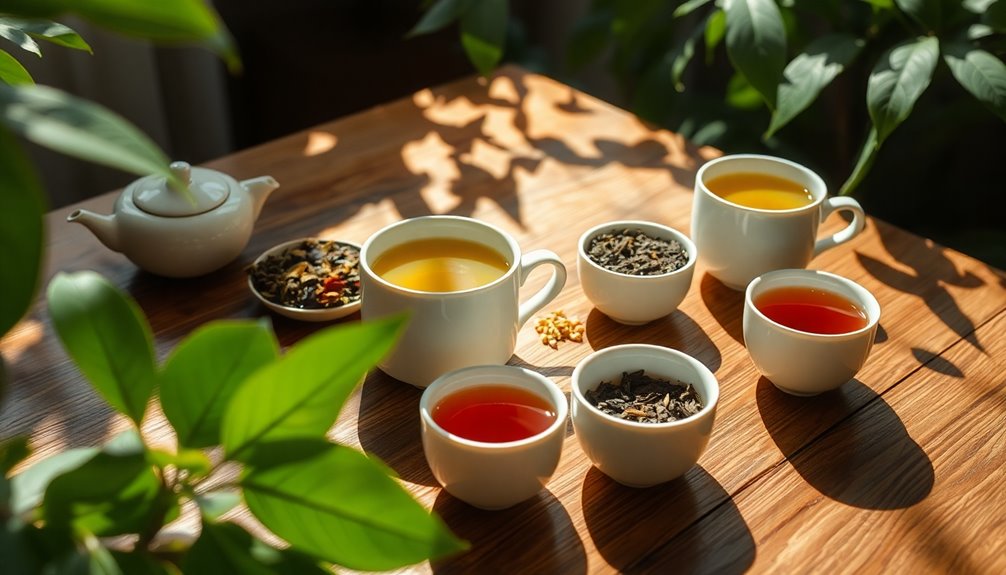
Choosing the right tea for meditation can significantly enhance your practice. When you're preparing for morning meditation, consider green or white tea. These teas have moderate caffeine, which helps boost your alertness and concentration.
For evening sessions, herbal options like chamomile or mint are great choices, as they promote relaxation.
Creating a tea ceremony can also deepen your meditation experience. Engage in Tea Mindfulness by focusing on the warmth and aroma of your tea. Just preparing a simple cup of tea can set a calming atmosphere that leads to more effective meditation sessions.
Remember, the unique flavors of different teas can evoke emotional responses, helping you connect more deeply with the present moment.
When you sip your tea, engage your senses fully. Taste the flavors and inhale the scent, allowing this mindfulness to enhance your awareness.
Theanine, found in green tea, can help improve your mood and reduce anxiety, making it an excellent choice for meditation.
Frequently Asked Questions
Can Specific Tea Types Improve Meditation for Beginners?
Yes, certain tea types can enhance your meditation experience. Herbal teas like chamomile or green tea can promote relaxation and focus, helping you settle into your practice more easily and deepening your mindfulness sessions.
How Does Tea Temperature Affect Meditation Experience?
Tea temperature significantly impacts your meditation experience. If it's too hot, you might get distracted by discomfort; if it's too cold, you may lose focus. Finding that perfect balance can enhance your overall mindfulness practice.
Are There Any Negative Effects of Tea on Meditation?
Yes, excessive caffeine from tea can lead to jitters, anxiety, or restlessness, which might disrupt your meditation. It's important to choose herbal or low-caffeine options to maintain a calm, focused state during practice.
What Is the Best Time to Drink Tea for Meditation?
The best time to drink tea for meditation is about 30 minutes beforehand. This allows the calming effects to set in, enhancing your focus and creating a serene atmosphere for your practice. Enjoy the moment!
Can Caffeine in Tea Disrupt Meditation Focus?
Caffeine in tea can indeed disrupt your meditation focus. If you're sensitive to stimulants, it's best to choose herbal teas or caffeine-free options to maintain a calm and centered state during your practice.
Conclusion
In conclusion, exploring different tea flavors can really boost your meditation practice! By choosing calming flavors like chamomile or refreshing ones like peppermint, you can help your mind focus better. Remember, your favorite tea can make meditation even more enjoyable. So, why not grab a cup next time you meditate? Experiment with flavors and see how they affect your peace of mind. With a little practice, you'll find that tea and meditation make a perfect pair!

